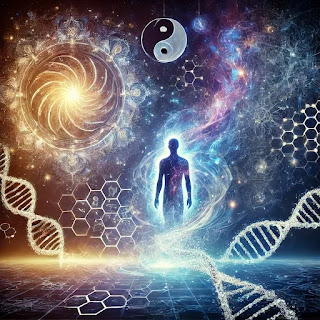Rebirth, or reincarnation, is a concept deeply rooted in ancient Indian philosophy and spirituality. It suggests that the soul undergoes a cycle of birth, death, and rebirth, influenced by karma (actions) from past lives. While reincarnation is often considered a matter of faith, modern science has begun to explore evidence that supports this ancient belief. In this detailed exploration, we’ll examine the science of rebirth, its connection to ancient Indian texts, and the evidence that suggests reincarnation might be more than just a myth.
1. What is Rebirth or Reincarnation?
Rebirth, or punarjanma in Sanskrit, is the belief that the soul (Atman) is eternal and undergoes a cycle of birth, death, and rebirth. This cycle is governed by karma, the law of cause and effect, which determines the conditions of one’s next life.
Key Concepts:
Atman: The eternal soul that reincarnates.
Karma: The accumulated actions from past lives that influence future rebirths.
Moksha: Liberation from the cycle of rebirth, achieved through self-realization and spiritual practice.
2. Rebirth in Ancient Indian Texts
Ancient Indian texts, particularly the Vedas, Upanishads, and Bhagavad Gita, provide profound insights into the concept of rebirth:
a. The Upanishads
The Upanishads describe the soul as immortal and eternal, undergoing a cycle of rebirth until it achieves liberation (Moksha).
They emphasize the importance of self-realization and spiritual knowledge in breaking the cycle of rebirth.
b. The Bhagavad Gita
In the Bhagavad Gita, Lord Krishna explains to Arjuna that the soul is indestructible and transcends death.
He describes rebirth as a natural process, driven by karma and the soul’s unfulfilled desires.
c. The Law of Karma
The law of karma states that every action has consequences, which influence the soul’s journey through multiple lifetimes.
Positive actions lead to favorable rebirths, while negative actions result in suffering and unfavorable conditions.
3. Scientific Studies on Reincarnation
Modern science has begun to explore the possibility of reincarnation through various studies and case reports:
a. Dr. Ian Stevenson’s Research
Dr. Ian Stevenson, a psychiatrist at the University of Virginia, conducted extensive research on children who claimed to remember past lives.
He documented over 2,500 cases worldwide, many of which included verifiable details about the child’s previous life.
Examples include children recalling specific names, locations, and events that were later confirmed to be accurate.
b. The Case of Shanti Devi
Shanti Devi, a girl from Delhi, India, claimed to remember her past life as a woman named Lugdi Devi from Mathura.
She provided detailed information about her previous family, which was later verified by investigators.
This case is one of the most well-documented examples of reincarnation.
c. Near-Death Experiences (NDEs)
Some individuals who have experienced near-death events report memories of past lives or a sense of continuity beyond death.
While NDEs are not definitive proof of reincarnation, they suggest the possibility of consciousness existing beyond the physical body.
4. The Role of Consciousness in Rebirth
Ancient Indian philosophy and modern science both emphasize the role of consciousness in the process of rebirth:
a. Universal Consciousness
According to the Upanishads, the soul is a part of Brahman, the universal consciousness.
Rebirth is seen as a journey of the soul through different forms, driven by karma and the desire for self-realization.
b. Quantum Consciousness
Some modern theories propose that consciousness operates at a quantum level, allowing it to transcend the physical body.
This aligns with the idea that the soul can exist independently of the body and reincarnate into new forms.
5. Philosophical Implications of Rebirth
The concept of rebirth raises profound philosophical questions:
a. The Nature of the Soul
If the soul is eternal and undergoes rebirth, what is its true nature?
Ancient texts suggest that the soul is pure consciousness, free from the limitations of the physical world.
b. The Purpose of Life
Rebirth implies that life has a purpose beyond the physical realm, such as spiritual growth and self-realization.
This aligns with the ancient Indian goal of achieving Moksha, or liberation from the cycle of rebirth.
c. The Ethics of Karma
The law of karma emphasizes the importance of ethical behavior, as actions in this life influence future rebirths.
This encourages individuals to live with integrity and compassion.
6. Practical Applications of Rebirth
Understanding rebirth can have practical implications for personal growth and well-being:
a. Spiritual Growth
The belief in rebirth can inspire individuals to focus on spiritual practices like meditation, yoga, and self-inquiry.
These practices can help individuals break free from negative karmic patterns and achieve liberation.
b. Emotional Healing
Reflecting on past lives can provide insights into current emotional challenges and help individuals heal from past traumas.
Techniques like past-life regression therapy are used to explore and resolve karmic issues.
c. Ethical Living
The law of karma encourages individuals to live ethically and mindfully, knowing that their actions have consequences.
This can lead to a more compassionate and harmonious society.
7. The Future of Rebirth Research
As science and spirituality continue to intersect, the study of rebirth is likely to gain more attention:
Consciousness Studies: Research into the nature of consciousness could reveal new insights into the process of rebirth.
Quantum Physics: Exploring the quantum nature of reality could provide a scientific basis for the existence of the soul and reincarnation.
Case Studies: Continued documentation and analysis of reincarnation cases could provide further evidence for this phenomenon.
Conclusion
The science of rebirth bridges the gap between ancient Indian wisdom and modern scientific inquiry. While reincarnation remains a controversial and elusive concept, the evidence from case studies, near-death experiences, and consciousness research suggests that it might be more than just a myth. By exploring these ancient and modern ideas, we can gain a deeper understanding of the nature of the soul, the purpose of life, and the interconnectedness of all beings.
#Rebirth #Reincarnation #Ancient Indian Texts #Karma #Atman #Moksha #Past-Life Memories #Near-Death Experiences #Consciousness Studies #Quantum Physics #Spiritual Growth #Bhagavad Gita #Upanishads #Soul and Consciousness #Philosophical Questions #Emotional Healing #Past-Life Regression





